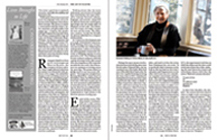Poets & Writers Magazine welcomes letters from its readers. Please post a comment on select articles at www.pw.org/magazine, e-mail editor@pw.org, or write to Editor, Poets & Writers Magazine, 90 Broad Street, Suite 2100, New York, NY 10004. Letters accepted for publication may be edited for clarity and length.
 Mother Tongue
Mother Tongue
In “The Art of Reading Rosmarie Waldrop” (September/October 2013), Susannah Lawrence omits one significant factor in this poet’s disruption of syntax: the fact that Waldrop’s first language is German. Unlike English, which uses word order (subject, object) to convey the function of nouns, German has declensions, variations in nouns and pronouns that convey syntactical function, number, and gender. That makes word order in a sentence less important. A phrase in which the verb comes at the very end, such as the line Lawrence quotes, “Over which we must a woolen blanket spread,” is commonplace in German.
Jacqueline Lapidus
Brighton, Massachusetts
Backstory Back-and-Forth
Eleanor Henderson’s “I Wasn’t Born Yesterday: The Beauty of Backstory” (September/October 2013) was balm on my irritated recollection of Benjamin Percy’s “Don’t Look Back: The Problem With Backstory” (November/December 2012). I share Henderson’s complaint about stories “built on the thin and faulty foundation of the present.” That’s not all that’s thin in contemporary fiction, increasingly written and read by a social media generation with a short attention span. Thinly developed characters often speak to one another in thinly developed settings for thinly textured pages of dialogue. Thanks for giving us both sides of the (back)story.
Sohrab Homi Fracis
Jacksonville, Florida
Last summer, at a workshop led by a well-known author, I submitted a piece that included flashbacks. She buried me in front of the class, categorically denouncing flashbacks altogether. In my fight-or-flight mode, I retaliated with far too much vigor. After a restless night’s sleep, I realized that the workshop, for me, had become a waste. If the instructor had approached the subject with views from both sides of the debate, we both could have marched on with undrawn swords. Incidentally, at age eighty-one, I am mentally and emotionally immersed each day in the backstory of my life. It balances me. It provides me perspective—as a person and as a writer.
Excerpted from a comment posted on pw.org by readinto
In The God of Small Things, Arundhati Roy takes readers into three different time frames in the first four pages, and continues to move among front-, back-, and middle-stories throughout the book. Stripped of this technique, the novel would lose a great deal of its richness. As Henderson points out, any technique can be well or ill used. A thriller may need no backstory to be excellent. Many stories, however, certainly need it to be at all effective.
Excerpted from a comment posted on pw.org by savitzour
Why We Write
I was going to write in praise of “Why We Write: Tilted Naked Weirdo” (July/August 2013) by Nancy Méndez-Booth, which is awesome in its honesty. Instead I realized that “Why We Write: A Topic Too Risky” (September/October 2013) by Tracy Strauss hit closer to home. Both writers should be praised for their courage and honesty. Such writing gives us all an opportunity to experience another life, and to rethink our own assumptions.
Kris Marriott
Reno, Nevada







